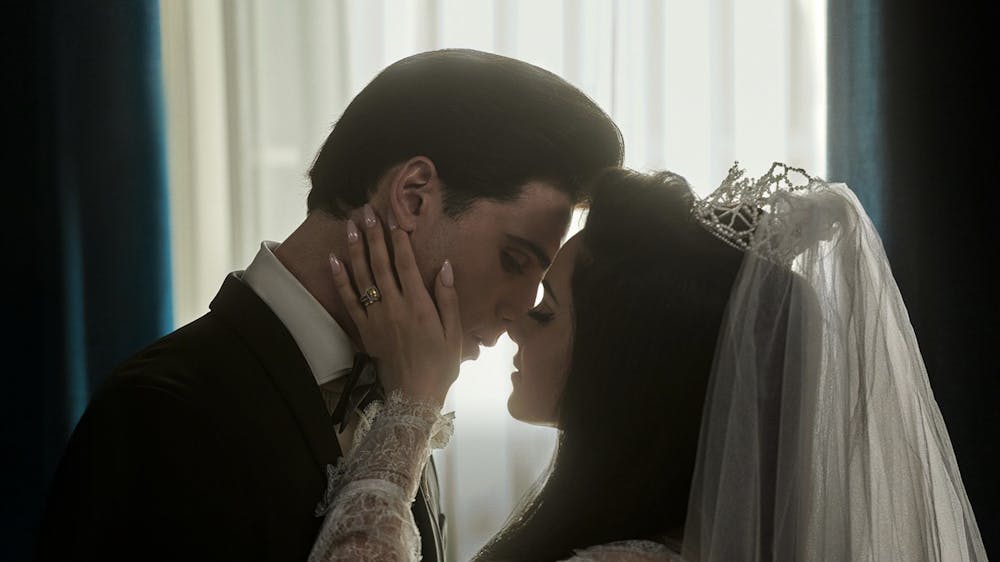“Do you like Elvis?” asks a twenty-something army officer to 14-year-old Priscilla Beaulieu (Cailee Spaeny) at a diner in West Germany.
“Of course, who doesn’t?” she confidently responds.
This is the moment Young Priscilla learns that Elvis Presley (Jacob Elordi) is stationed at the same military base as her father, and her enthusiasm for the officer’s question has gotten her an invite to a party hosted by the rock and roll legend that evening. Priscilla — small, delicate and soft-spoken — is promptly thrust into Elvis’s orbit without much consideration. It appears normal, natural even, for a girl her age to be fraternizing with a man 10 years older than herself.
Sofia Coppola’s 2023 film “Priscilla” brilliantly sheds light on Elvis’s stardom from the perspective of his wife, exploring the significant age gap and power imbalance that defined their relationship from its inception in 1959 to its end in 1973.
“Priscilla” received considerable press attention following Lisa Marie Presley’s disapproval of the film’s script before her untimely death in January 2023. Lisa, Elvis and Priscilla's daughter, objected to the film’s controversial portrayal of her father: According to a September 2022 email published by Variety, Presley felt that “My father only comes across as a predator and manipulative” in the film.
“As his daughter, I don’t read this and see any of my father in this character,” the email continued. “I read this and see your shockingly vengeful and contemptuous perspective and I don’t understand why?”
The film, produced by Priscilla Presley and based on her 1985 memoir “Elvis and Me” lies in stark contrast to Baz Luhrmann’s acclaimed 2022 film “Elvis.” Luhrmann’s flashy biopic explicitly honors Elvis and celebrates his impressive legacy, in the process overlooking many of the unfavorable attributes that lay behind his epic persona and generally obscuring the role of Priscilla. “Priscilla” is much the opposite, delving into the nitty-gritty that defined the couple’s relationship through the ’60s and early ’70s. Coppola certainly doesn’t shy away from casting Elvis in a critical light.
The beginning of the film finds Priscilla’s family recently relocated to a U.S. military base in Bad Nauheim, West Germany. Isolated and struggling to adjust to her new life, Priscilla finds solace in her relationship with Elvis. When they first meet, Priscilla is 14 and he is 24 — an age gap that is emphasized by the stark differences in their respective appearances. Elvis towers over Priscilla, is surer in the way he speaks and sports a confidence and charm that reels Priscilla in.
The film’s opening scenes are jarring, made all the more uneasy by the sense of normalcy that characterizes them. There is no looming sense of awkwardness or danger in the initial interaction between Priscilla and the aforementioned military officer who approaches her in the diner, which is precisely what makes the whole interaction so disconcerting. There also don’t seem to be any moral objections to Elvis’s attraction to Priscilla — the couple’s first kiss is presented by Coppola as any girl’s first kiss might be, pure and wonderstruck. Yet the grooming that lies at the root of their relationship can’t be overlooked. Despite being 14, Priscilla is treated as if she’s a grown woman. Coppola’s ability to effectively convey the couple’s relationship without glamorizing it or compromising the film’s aesthetic is one of the work’s hallmarks.
It is interesting to witness how the objects Priscilla surrounds herself with begin to change as her relationship with Elvis progresses. Her girlish trinkets, shown in a gorgeously curated montage early on in the film, are gradually swapped for stilettos, cosmetics and bottles of Chanel No. 5 as she begins her premature entry into adulthood. During her first trip to Vegas with Elvis, milkshakes at the military base are swapped for martinis and amphetamines. Her exposure to gambling, luxury and paparazzi all prove to be factors that open up Priscilla to a new realm of experience, challenging her to quickly mature and adapt to a vastly different lifestyle.
The pacing of “Priscilla” is one of the work’s most intriguing features. The film follows a certain rhythm wherein one moment Elvis is unable to take his attention off of Priscilla, and in the next is all too ready to coldly dismiss her. Priscilla, initially a naive child, is too weary to recognize his pattern of emotional abuse. He is older, more mature and a star — and she seems terrified to lose him. As she grows, though, Priscilla begins to more astutely recognize and respond to the cycles of his behavior. By the end of the film, it becomes clear to both Priscilla and the audience that there is no future in the couple’s relationship. Priscilla is unable to live a life of her own if she exists to serve Elvis.
Even if the film portrays Elvis in a negative light, it consciously maintains his humanity. He is not shown to be evil, but instead emotionally turbulent and discontent. The film, bearing Elvis’s erratic emotional state in mind, treats the subject with complexity. This is not an overtly negative portrayal of Elvis just for the sake of shock value. The film instead draws from Priscilla’s perspective, with her being the foremost one to endure his erratic behavior during these tumultuous years.
Coming out a year after Luhrmann’s “Elvis,” Coppola’s “Priscilla” effectively adds a new perspective to the story put forth by the former. In this regard, the work comes at an opportune time. It is a sympathetic exploration of growth and identity, an insightful work that poses questions that are often overshadowed by Elvis’s impressive legacy. It is, without a doubt, worthy of your attention.





